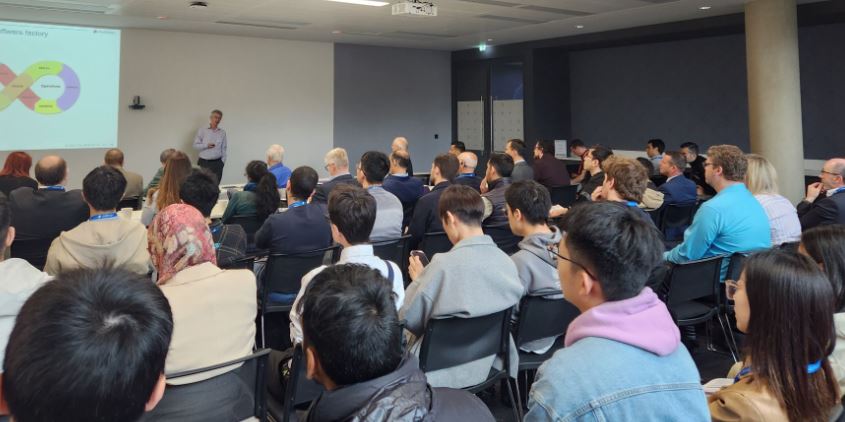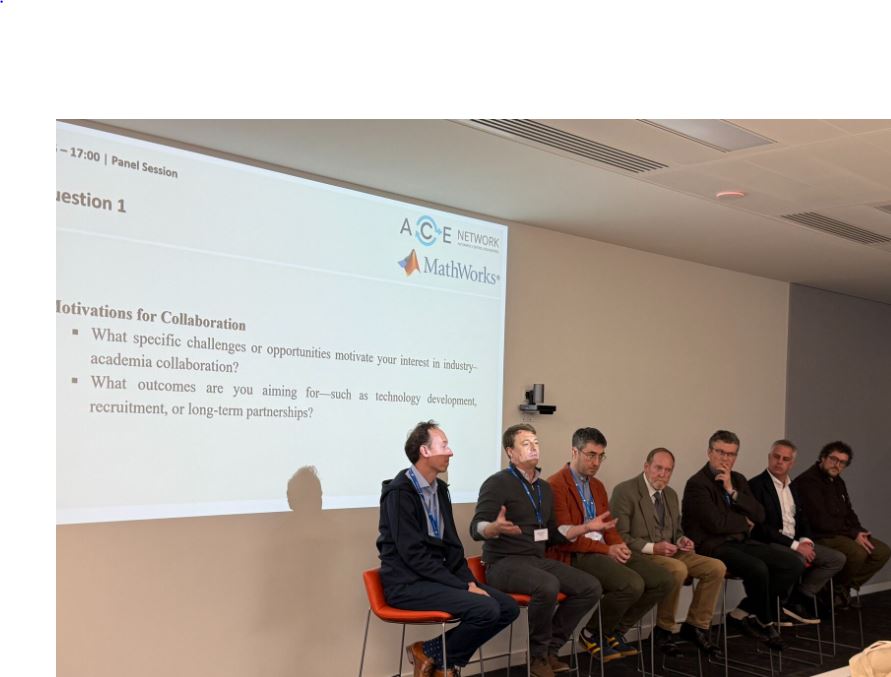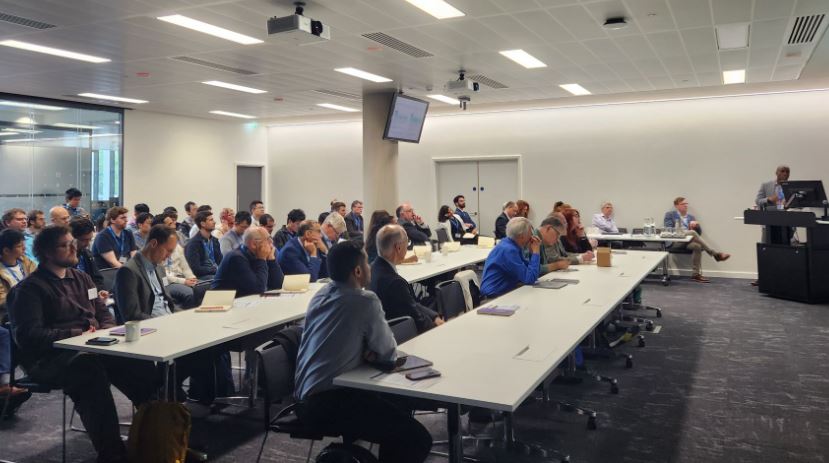Post-Event Report: Inspiring Innovation through Industry-Academia Collaboration

Post-Event Report: Inspiring Innovation through Industry-Academia Collaboration
Author: Keith J Burnham (Aston University)
Introduction
Following months of planning, the joint ACE-MathWorks ‘inspiring innovation through industry-academia collaboration’ took place on 5 June 2025, with an action-packed programme comprising presentations, discussions, and networking sessions. The main thread of the day was centred on the multi-faceted benefits of nurturing and maintaining effective collaboration between academia and industry from a control system engineering design perspective.
There were some excellent examples presented on the day by a mix of well-established professionals as well as younger members from academia and industry spanning both theory and application. These included the wider generalised control design approaches developed from earlier specific problems as well as some of the more recent specific industry problems where solutions are still required to be found. As is often the case, these latter examples could well form the basis of further generalised control design approaches of the future.
One such ‘hot topic’ that led to a lively discussion, was the perceived requirement for a generalised approach for constructing sophisticated models and the need for libraries of continuously updated models and model types, as opposed to developing models from scratch, which is commonly the case in practice. Such an approach would require a significant ‘leap of faith’ in terms of establishing a culture of adopting existing models and/or sub-models, and corresponding auto-code generation, without question. It is clear, however, that such a future development could enable enhanced rapid prototyping of control system designs, particularly where there is a need for reduced time/cost and continually improved competitiveness in terms of operational efficiencies.
A panel session took place in which the questions raised led naturally to a discussion on the best ‘tried and tested’ practices of collaboration and the need for more effective use of models and generalised model libraries that have already been developed and validated for application types. Of course, to realise such a shift this would require undergraduate and postgraduate control curricular to be redesigned to appropriately teach and assess the knowledge/understanding of future control system design engineers. Whilst the latter is already an on-going issue, which is ironically nowadays only exacerbated by the current conflicting constraints within university funding, i.e., student numbers versus pass rates, it was at least amusing to note that this is indeed itself a control design problem!

Programme Highlights
The day kicked off with registration and a light breakfast and the buzz of networking became evident almost immediately. Prof Fulvio Forni, University of Cambridge, formally welcomed all delegates and introduced Dr James Pickering, Aston University, who had, in collaboration with colleagues from MathWorks, coordinated the programme and had liaised with the industrial and academic speakers.
The first session comprised four talks from industry spanning a range of application areas. The first speaker was Dr Gavin Walker, MathWorks, whose presentation focused on ‘the rise of engineered systems and the role of continuous integration’. Second was Dr Adam Stephen, UKAEA, with a presentation on the ‘control of plasma in a special Tokamak for energy production’, with emphasis on the nonlinearities. The third was Dr Othman Maganga, JLR, with a presentation on ‘the control of an all electric car for 2030’, highlighting the challenges of software/model-based approaches. The fourth presentation was by Alex Haslam and Dr Felipe Corkes, Carbon Re, who described the problems in the ‘control of cement plants’ using AI and machine learning. The messages were clear, that from an industry perspective, there are some very interesting control problems that are yet to be resolved and, in parallel with the advances in technology, that these will inevitably continue to present themselves.
The second session comprised presentations describing the experiences of industrial collaboration by three well established academic professors. The first speaker was Prof Jan Maciejowski, University of Cambridge, who described the numerous ways he had collaborated over the years with undergraduate, masters and PhD student projects, and highlighted the need to maintain the conversational links post completion. Second was Prof Stephen Duncan, University of Oxford, who had chosen one particular collaborative project concerning the issues and design solution for a synchrotron electron beam stabilisation problem. One aspect was to emphasise that collaboration can sometimes surprisingly arise ‘out of the blue’, and can often subsequently lead to long-term successful industrial links. The third presentation was given by Prof Roger Dixon, University of Birmingham, who had previously worked in industry and has been involved in several collaborative ventures from both ‘sides of the fence’, and continues to advocate collaboration in his current academic role. The three speakers all gave accounts of anecdotal experiences, advising on best practice from their individual perspectives.

There was definitely a buzz in the air by the time the lunch and extended networking session was underway, with delegates renewing old friendships as well as developing some new friendships and potential collaborations being established. It was clear that the mix of a diverse range of industrial challenges and accounts of real-life experiences of effective collaboration had triggered a significant amount of interest and positive discussion amongst the delegates.
Immediately following the lunch break there were three short presentations dealing with collaborative funding mechanisms, with talks by Helen Francis, University of Cambridge, Richard Allin, Innovate UK, and Cais Jurgens, Crowdhelix. This was followed by nine 2-minute academic research pitches, as follows (names and affiliations stated only): Dr James Pickering, Aston University, Dr Joannis Lestas, University of Cambridge, Prof Daniel Auger, Cranfield University, Dr Moshen Zahmatkesh, University of Durham, Dr Chao Chen, University of Manchester, Dr Anton Selivanov, University of Sheffield, Dr Lan Ian Su, University of Manchester, Dr Yuanbo Nie, University of Sheffield, and Dr Zehar Belkhatir, University of Southampton. The pitches gave the academics an opportunity to show case their current research and to strike up interest to form potential industry and/or academic partnerships/collaborations.
A special presentation dealing with ‘theory to practice’ was given by Prof Malcolm Smith, University of Cambridge, who described the initial unexpected steps leading to what was to become an extremely successful collaboration with ‘the inerter story’. Whether delegates had heard/seen the presentation before or whether it was for the first time, this is a truly remarkable example of going back to ‘square one’, reviewing the theory and realising the solution in practice. It emphasises the need for, and the ability of, the control systems engineer/designer to go back to fundamental theory and to apply this.
A short presentation on ‘Mentorship and EDI (equality, diversity and inclusion)’, was given by Dr Francesca Boem, UCL. This was followed by the panel session as alluded to in the Introduction, (panel member names and affiliations stated only): Dan Ridgwell, BMT, Dr Ivan Zajic, Fortescue, Cais Jurgens, Crowdhelix, Matt Greenhaigh, Siemens, Prof Keith Burnham, Aston University, Prof Guido Herrmann, University of Manchester and Dr Ross Drummond, University of Sheffield. Several questions/observations concerning effective academia-industry collaboration were raised and panel members were invited to give their views. As alluded to in the Introduction, one key issue and common thread arising was an acknowledgement of the need for an overhaul of the undergraduate, postgraduate teaching and assessment, in terms of moving towards the adoption of ‘off the shelf models’ and incorporating the concept of ‘generalised model libraries’.
The formal event closure acknowledged the desire/need for a follow up meeting (to be arranged).
